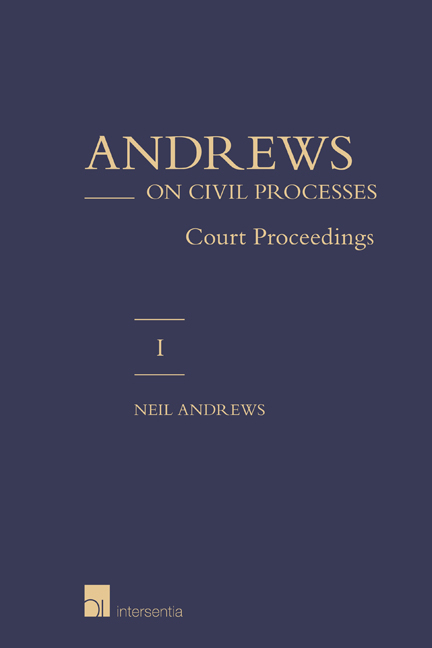Book contents
- Frontmatter
- Dedication
- Epigraph
- Preface
- Contents
- Table of Cases
- Table of Statutes
- Table of Statutory Instruments
- PART I INTRODUCTION TO THE FORMS OF CIVIL JUSTICE
- PART II COMMENCEMENT OF COURT PROCEEDINGS AND PREPARATION FOR TRIAL
- PART III END-GAME: TRIAL, APPEAL, FINALITY AND ENFORCEMENT
- PART IV COSTS AND FINANCING OF LITIGATION
- PART V SPECIAL PROCEEDINGS
- Chapter 21 Protective Relief
- Chapter 22 Multi-Party Litigation
- Chapter 23 Complex Litigation
- Chapter 24 The Commercial Court
- PART VI PRINCIPLES OF CIVIL LITIGATION
- PART VII THE EUROPEAN CONTEXT
- Select Bibliography
- Index to Volumes I and II
Chapter 23 - Complex Litigation
from PART V - SPECIAL PROCEEDINGS
Published online by Cambridge University Press: 13 December 2017
- Frontmatter
- Dedication
- Epigraph
- Preface
- Contents
- Table of Cases
- Table of Statutes
- Table of Statutory Instruments
- PART I INTRODUCTION TO THE FORMS OF CIVIL JUSTICE
- PART II COMMENCEMENT OF COURT PROCEEDINGS AND PREPARATION FOR TRIAL
- PART III END-GAME: TRIAL, APPEAL, FINALITY AND ENFORCEMENT
- PART IV COSTS AND FINANCING OF LITIGATION
- PART V SPECIAL PROCEEDINGS
- Chapter 21 Protective Relief
- Chapter 22 Multi-Party Litigation
- Chapter 23 Complex Litigation
- Chapter 24 The Commercial Court
- PART VI PRINCIPLES OF CIVIL LITIGATION
- PART VII THE EUROPEAN CONTEXT
- Select Bibliography
- Index to Volumes I and II
Summary
INTRODUCTION
England has no separate ‘manual’ or ‘code’ dealing specifically with complex litigation.
Complex litigation might be defined as proceedings which involve an unusual level of difficulty and preparation by reason of: (i) the case's facts, including questions of a technical or specialist nature; (ii) the law applicable to the dispute; (iii) the number of issues within the overall dispute; (iv) the number of parties participating in the action, especially if they are separately represented, or there are significant variations between individual claims or defences (multiparty litigation (22.01 ff) is the most obvious type of complex litigation); (v) the variety of procedural steps taken during the evolution of the case, including one or more levels of appeal from those decisions; (vi) uncertainty concerning the applicable jurisdiction; (vii) overlaps between jurisdictions; or, finally, (viii) attempts to re-litigate the same, similar, or overlapping matters.
As the former Master of the Rolls, Sir Anthony Clarke (now Lord Clarke) has commented whatever its origins might be, one knows ‘complexity’ when one sees it. A leading American study of complex litigation fastens upon (i) legal and factual difficulty; (ii) large number of parties; and (iii) (with admirable candour) the authors add: ‘the amount of money or the stakes involved may prompt litigation efforts on such a scale that a case which would otherwise not be complex becomes complex.’
In England, complex litigation normally proceeds to the High Court. It will tend to concern, for example, intellectual property disputes, large fraud cases, judicial review of central and local government decisions, difficulties arising from detailed commercial transactions, insolvency proceedings following the collapse of large financial entities, and mass tort or other multi-party litigation. By contrast, relatively uncomplicated disputes concern small consumer claims, debt collection on undisputed facts, housing disputes, and straightforward claims for compensation where the law is clear and the facts (although disputed) are fairly readily ascertained. An example of exceedingly complex mass tort litigation was the group litigation which came before the Supreme Court in AB v. Ministry of Defence (2012) concerning alleged exposure to radiation during nuclear weapons testing in the 1950s and 1960s. In the event, the case was substantially abortive because the Supreme Court endorsed5 the Court of Appeal's refusal in that case to exercise the discretion to lift the limitation bar under section 33 of the 1980 Act (8.70). The claims were declared to be doomed to fail.
- Type
- Chapter
- Information
- Andrews on Civil ProcessesCourt Proceedings, pp. 659 - 670Publisher: IntersentiaPrint publication year: 2013

